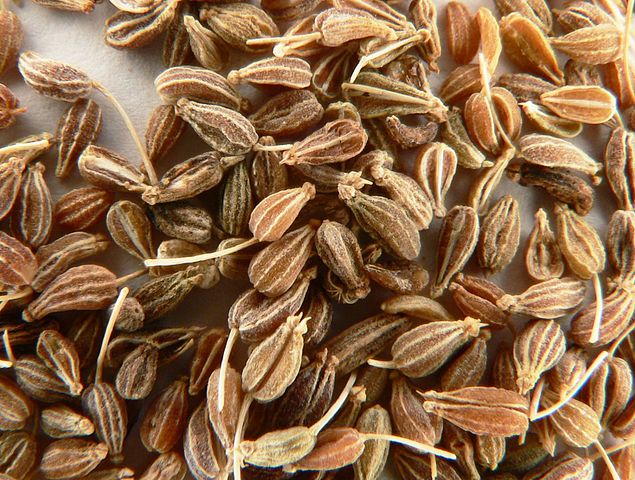Common Names and Other Names: (not to be confused with star anise)
- ** Anise
- Aniseed
- Sweet Cumin
- Anís (Spanish)
- Anis (French)
- Anisum (Latin)
Where Does It Occur:
Anise is native to the eastern Mediterranean region and Southwest Asia, specifically:
- Egypt
- Greece
- Turkey
- Syria
- Cyprus
It is now widely cultivated in:
- Southern Europe (Spain, Italy)
- Middle East
- North Africa
- Asia
- Mexico
- United States
Anise thrives in:
- ** Warm, frost-free climates
- Well-drained soils
- Full sun exposure
Basic Ingredients (Constituents):
Anise contains several bioactive compounds:
- ** Volatile Oils:
- Anethole (80–90% of the oil): Responsible for the characteristic licorice flavor and aroma.
- Estragole
- Anisaldehyde
- Anisyl Acetate
- Flavonoids: - Quercetin
- Kaempferol
- Phenolic Acids: - Caffeic Acid
- Chlorogenic Acid
- Proteins and Lipids
- Vitamins and Minerals:
- Vitamins: - Vitamin C – B Vitamins (B1, B2, B3, B5, B6)
- Minerals:
- Calcium
- Iron
- Magnesium
- Phosphorus
- Potassium
- Zinc
These constituents contribute to anise’s digestive, antimicrobial, expectorant, and antispasmodic properties.
Most Commonly Used For Treatment Of:
- ** Digestive Issues: - Carminative: Relieves flatulence, bloating, and indigestion.
- Stomachic: Stimulates appetite and aids digestion.
- Antispasmodic: Eases stomach cramps and colic.
- ** Respiratory Conditions: - Expectorant: Helps loosen mucus in cases of coughs, bronchitis, and asthma.
- ** Soothes sore throats and reduces coughing.
- ** Lactation Support: - Galactagogue: Traditionally used to increase milk production in nursing mothers.
- ** Menstrual Cramps: - Emmenagogue: May help regulate menstrual cycles and alleviate menstrual discomfort.
- ** Antimicrobial Activity: - Inhibits the growth of certain bacteria, fungi, and yeasts.
- ** Sedative Effects: - Mild relaxant properties may help reduce stress and promote sleep.
Side Effects:
Anise is generally safe when consumed in culinary amounts, but potential side effects may include:
- ** Allergic Reactions: - Skin Irritation: Dermatitis in sensitive individuals.
- Respiratory Symptoms: Rare cases of asthma or rhinitis.
- Excessive Consumption: - Large doses may lead to nausea, vomiting, seizures, or pulmonary edema due to anethole toxicity.
- ** Interaction with Medications: - Anticoagulants: May enhance bleeding risk.
- Estrogenic Effects: May interact with hormone therapies or birth control pills.
- ** Photosensitivity: - May increase sensitivity to sunlight, leading to sunburn.
Available Forms in the Market:
- ** Dried Seeds: - Used as a spice in cooking and for infusions.
- Essential Oil: - Extracted from seeds, used in aromatherapy and flavoring.
- Anise Tea: - Made from crushed seeds, consumed for digestive benefits.
- ** Capsules/Tablets: - Contain powdered anise seed or extract for supplementation.
- Syrups and Lozenges: - Used for coughs and sore throats.
- ** Anise Extract: - Used in baking and confectionery for flavor.
Research and Results:
- ** Digestive Health: - Study: Anise improves symptoms of dyspepsia and functional dyspepsia.
- Findings: Reduced bloating, nausea, and abdominal pain.
- ** Antimicrobial Activity: - Study: Anise essential oil exhibits antibacterial and antifungal properties.
- Findings: Effective against bacteria like E. coli, Staphylococcus aureus, and fungi like Candida albicans.
- Respiratory Benefits: - Study: Anise oil shows expectorant and bronchodilatory effects.
- Findings: Helps alleviate symptoms of asthma and bronchitis.
- ** Sedative Effects: - Study: Anise extracts exhibit mild sedative and anticonvulsant activities in animal models. - Findings: May help reduce anxiety and promote sleep.
Note: While these studies are promising, more clinical trials on humans are needed to confirm efficacy.
Precautions:
- ** Pregnancy and Breastfeeding: - Use with Caution: Generally safe in food amounts; consult a healthcare provider before using medicinally.
- ** Allergies: - Individuals allergic to anise or other Apiaceae family plants (e.g., celery, carrots) should avoid use.
- Hormone-Sensitive Conditions: - Due to estrogenic effects, individuals with conditions like breast cancer, endometriosis, or uterine fibroids should use cautiously.
- ** Medication Interactions: - Anticoagulants (e.g., warfarin): May increase bleeding risk.
- Hormone Therapies: May interfere with estrogen or contraceptive medications.
- ** Children: - Use with Caution: Not recommended for infants or young children without professional guidance.
- Epilepsy and Seizure Disorders: - High doses may lower the threshold threshold for seizures.
Conclusion:
Anise (Pimpinella anisum) is a flavorful herb with a long history of medicinal use, particularly for digestive and respiratory ailments. Its essential oil, rich in anethole, contributes to its therapeutic properties. Incorporating anise into your diet or health regimen may offer various benefits, but it’s important to use it appropriately.
Disclaimer:
This information is intended for educational purposes and should not replace professional medical advice. Always consult a qualified healthcare provider before using anise for medicinal purposes.
« Back to Glossary Index